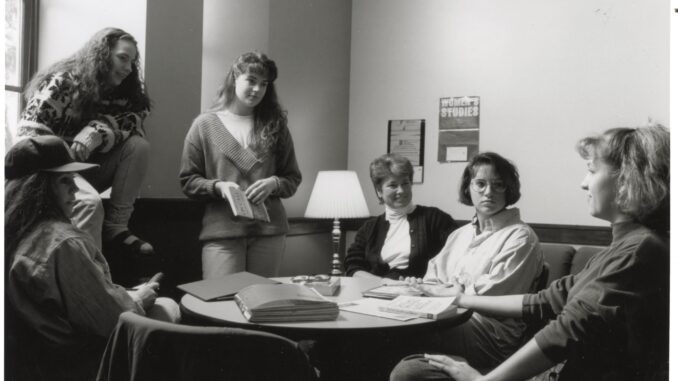
With two full-time professors and 21 classes in the major, professor of women’s, gender and sexuality studies (WGSS) Tricia Franzen said the WGSS Department at Albion “opens people’s minds,” allowing students to use department classes “as the inspiration to make the changes that will make life better for all of us.”
The establishment of the WGSS Department at Albion College was not accidental. According to Franzen, the process of establishing the WGSS department was set off after the founding of the National Women’s Studies Association in 1977, when “the Great Lakes College Association had major retreats and meetings starting in the late ‘80s, early ‘90s.”
For 157 years after its founding, Albion didn’t have a formal women’s studies program. The first women’s studies course was co-taught by two political science professors and offered as part of a Women’s Studies Concentration rather than a standalone major, Franzen said.
The program initially functioned through a faculty, staff and community committee, Franzen said, which later led to the establishment of a gender category requirement at the college in 1991.
Emeritus professor of WGSS Judith Lockyer, who was hired in 1985 as an English professor, said that legitimizing the department took “a proposal to hire somebody in women’s and gender studies” and “a lot of haggling.”
In 1992 Franzen was hired as the director of both the Anna Howard Shaw Women’s Center and the Women’s Studies Concentration. As the department grew, Franzen secured a tenure-track position, and the department shifted from focusing solely on women’s studies to incorporating gender and sexuality studies.
“We had the intro class, we had feminist theory and then we had whichever classes I taught,” Franzen said.
Challenges Facing the WGSS Department
In its early years, Lockyer said that faculty struggled to recognize women’s and gender studies as an “actual study.”
“The main thing was to convince them, to make them see, to help educate them, that studies in scholarship in women’s and gender studies were important,” Lockyer said.
Once established, Franzen said the WGSS Department faced skepticism, particularly around the inclusion of feminist perspectives and LGBTQ+ issues.
“There was a lot of questioning, particularly about using the word feminist, or including lesbian,” Franzen said. “As that field expanded and became more inclusive, there was a progression.”
Director of the Anna Howard Shaw Center for Gender Equity Lisa Winchell-Caldwell, alumna ‘06, who graduated with a major in WGSS said that although a long-standing issue is “perceptions about the department,” the curriculum applies to other interdisciplinary fields that do not have a single, clearly defined career path.
“People don’t see how those studies relate to other practical careers they may be interested in, or they don’t understand fully what those multidisciplinary departments do,” Winchell-Caldwell said.
WGSS Beyond the Classroom
Today, Franzen said the WGSS Department continues to be shaped by student interest and advocacy.
“Particularly on issues of gender and sexual identity, students come in, and they push us – they want to see these classes,” Franzen said.
In addition to coursework, student-led initiatives have played a key role in shaping the department’s influence on campus.
Lockyer said student organizations such as Break the Silence – now known as LGBriTs – were central to these efforts, giving “people the right to speak and not have to defend their identity all the time.”
Students were also instrumental in transforming the Center for Gender Equity, from “a very part-time entity to now being a full-time entity,” Franzen said.
The “partnership” between the Center for Gender Equity and the WGSS Department is dynamic, with initiatives ranging from guest lectures to shared planning efforts for speaker series and learning opportunities, Winchell-Caldwell said.
“We talk about things like the experiential learning opportunities for students, ways for students to work with my office and majors and minors within the department to meet together,” Winchell-Caldwell said.
The Importance and Future of WGSS at Albion
As the landscape of gender studies continues to evolve, so too does Albion’s WGSS Department.
“Women, gender and sexuality studies keeps adapting to the changes that are going on in our culture,” Franzen said. “While we are at a significantly frightening position right now, we don’t see backing away from that because it is our history.”
Winchell-Caldwell said that WGSS are broadly applicable, not only in gender-related careers but in public service and science.
“There are social impacts for people who are gender minorities, sexuality minorities, cis women and trans women,” Winchell-Caldwell said.
Looking forward, Petoskey sophomore and WGSS major Honor Slocum said the department’s future depends on “letting people know about the department,” adding that the program is doing “great so far.”
Winchell-Caldwell said what she’d “love to see is students whose background could be enriched by more exposure to the ideas that are being covered in the department.”
When it comes to taking WGSS classes, Lockyer said she thinks “students are interested and ready. Sometimes, they just don’t have the information.”

Leave a Reply